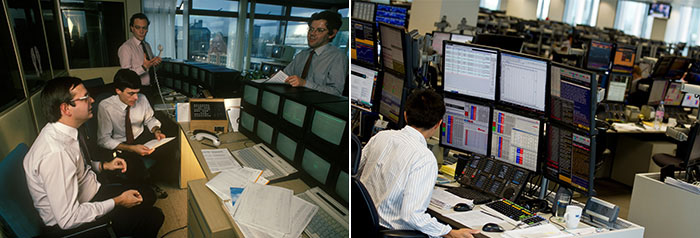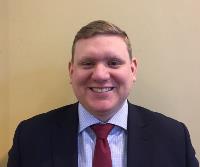The financial landscape today is markedly different from when the Securities Institute first formed in 1992, as is the CISI itself, but how have day-to-day working lives and individual attitudes changed? Long-time member and former CISI director Clare Gore Langton and new joiner Luke Phipps ACSI share their views.
What is a typical day like in your current role? Luke:
As a wealth manager, a typical day will involve working with the bank’s relationship managers to help identify and introduce clients that may need regulated financial advice. I also meet with these clients to understand their circumstances and objectives, and to see how we can help them.
Clare, how does this compare to 25 years ago? Clare: On a day-to-day basis my team manage a portfolio of private clients, trusts and self-invested personal pensions (SIPPs). Interestingly enough, it’s very similar to how it was 25 years ago, which is the nature of the business – I still sit opposite the same colleague! Attitudes have changed, though. When I first started off you were quite careful about how you addressed the older people, but exams have really sorted this out. You respect the people who have done all the qualifications. It’s a much more level playing field from that point of view.
What is your current working environment like? Luke: I work within a team of six wealth managers and one wealth analyst. We regularly share ideas and best practices via weekly audios and get together at least once a month for team meetings. In between these times we tend to work out of our own locations and integrate with the branch staff and local relationship managers. Our client meetings are typically conducted on a face-to-face basis, although the use of telephone and email is useful for general communication purposes. I wouldn't be surprised if we were also able to offer client meetings via a secure video link in the not too distant future.
Clare, again, how does this compare to how it was 25 years ago? Clare: A key difference is that we work in a very nice environment that is smoke free. When I was pregnant 30 years ago, I sat opposite a man who was a chain smoker next to an open window! Now, the office is air-conditioned and very comfortable for us. The service for the clients has also improved immeasurably because of all the IT and other services that we can offer. But the journey to work is more difficult – the Northern line was considerably less busy 25 years ago!
What do you think working life in the financial services sector will be like 25 years from now? Luke: I believe that improved technology will continue to give clients more ways to interact with their service providers, online or through mobile devices. I expect that we will see less physical presence from a lot of organisations, and more virtual interfaces. Some clients will continue to want or need face-to-face contact, and I believe this should still be available.

A trading floor in 1992 compared to a typical set-up today
Clare: I think many more people will be working from home. At my age, I’m always quite glad to come into the office as I like the company of other people. In terms of technology, I don’t buy into the whole ‘robo’ thing. It’s a new generation thing, but I’m quite a believer that there are still a lot of people who are money rich and time short, and personal advisers in direct contact can help them with that.
Under what circumstances did you become a member of the CISI, and also a member of the board, Clare? Clare: I knew the deputy chairman of the Stock Exchange (SE) Ian Salter, who, when changes came about in the SE, was tasked by the chairman Sir Andrew Hugh Smith to work out how they were going to deal with the individual members – he very kindly invited me to join the steering committee. The Institute was a breath of fresh air. I started off at Lazard Securities and in my time you practically had to beg to do exams. The Institute put a huge emphasis on getting the industry to accept that exams were absolutely the way forward.
Luke: A recent promotion has taken me into a new area where the preference is to have the CISI as our professional body. I am currently studying for the
Private Client Investment Advice & Management (PCIAM) exam in June, which I hope to pass! The CISI also gives me the ability to effectively track my continuing professional development (CPD), which is a fundamental part of my role.
Clare, how has the Institute changed since its inception in 1992? Clare: We started off with small beginnings – the basis of the Institute being 4,000 individual members of the SE who had to be found a home. We were hoping to at least maintain this level, but we’ve been incredibly pleased with the fact that we’ve expanded to 40,000 members, not least by broadening the membership categories. That’s been tremendously interesting over the years, because of the inclusion of all of the different geographical areas as well.
Clare Gore Langton
 Clare Gore Langton, Chartered FCSI(Hon) is an investment director at Rathbone Brothers, with a wealth of experience working with private client investment portfolios. She was a director at the CISI from 1992 to 2010, and is now chairman of the CISI Educational Trust and a member of the CISI Investment Committee.
Clare Gore Langton, Chartered FCSI(Hon) is an investment director at Rathbone Brothers, with a wealth of experience working with private client investment portfolios. She was a director at the CISI from 1992 to 2010, and is now chairman of the CISI Educational Trust and a member of the CISI Investment Committee.
Luke Phipps
 Luke Phipps ACSI is a wealth manager at NatWest Bank’s Private Client Advice division. He has recently joined as a CISI member and is studying for the Private Client Investment Advice & Management (PCIAM) exam this year.
What are your thoughts on education within financial services?
Luke
Luke Phipps ACSI is a wealth manager at NatWest Bank’s Private Client Advice division. He has recently joined as a CISI member and is studying for the Private Client Investment Advice & Management (PCIAM) exam this year.
What are your thoughts on education within financial services?
Luke: I think financial services should have a bigger part in the education curriculum. Subjects such as tax and pensions can blow most people's minds, but it really doesn't have to be that difficult if you take it back to the basics. On a broader basis, organisations such as the Money Advice Service, Pension Wise and the Citizens Advice Bureau can be very useful for consumers and organisations alike. I think it's even better that there is some further work being done at the moment to potentially simplify and amalgamate some of these departments so people will have a clearer choice on where to go for guidance.
Clare: At the
CISI Educational Trust we’re trying to make public financial education much more acceptable. And we’re putting money in, subsidising or providing teachers and support in Liverpool or East London – areas where there is a huge financial services industry, and therefore an employment opportunity. The Trust is also driving the apprenticeship programme. There’s a real opportunity for kids to get involved now, and training is key. Unlike in my day, where training wasn’t necessarily part of it, one of the best things that’s happened over the last 25 years is that if you come and work for any reputable firm, high quality training is a given.
What, in your opinion, have been the biggest changes in financial services over the past 25 years? What do you believe will be important going forward?Luke: Even though I have only been in the financial services industry for just over 12 years, I have seen a significant change in the way our clients choose to deal with us. I can remember when mobile phones first came out and it was impossible to view web pages on your device. Now we can do nearly everything we need on the phone. I think it's good to have choice.
I also think it's important to maintain a high level of regulation. This helps to set boundaries, which companies can continue to interpret in their own way, but hopefully stay within the guidelines – consumer confidence and trust is vital to our work.
Clare: I think the first Markets in Financial Instruments Directive (MiFID I) was certainly a huge change, where we had to ask many more questions about how we were running our businesses and what we were offering to clients. Definitely the Retail Distribution Review (RDR), whereby we had to identify all of our training needs and be very much up to speed. I had to sit the Private Client Investment Advice & Management (PCIAM) exam along with many much younger people! And there’s also the move to electronic trading. Now, I think the market is contracting, as is the amount of research. There is so much more information that’s available online, which makes life difficult for some of the brokers that have to charge for research under MiFID II. At the moment there’s a huge amount of company consolidation that’s going on, not least because everything is scalable. Things have changed from that point of view. And now with MiFID II coming, we’ll have to wait and see what happens.
Seen a blog, news story or discussion online that you think might interest CISI members? Email rosalie.starling@wardour.co.uk.